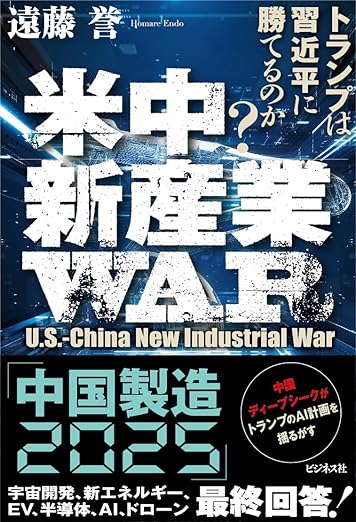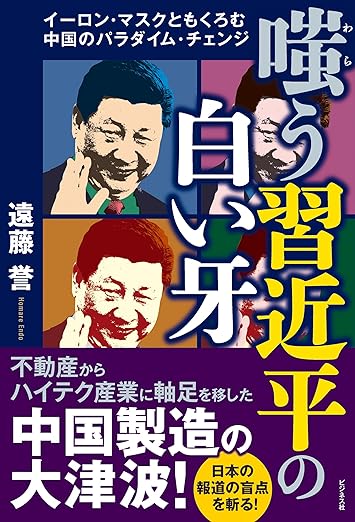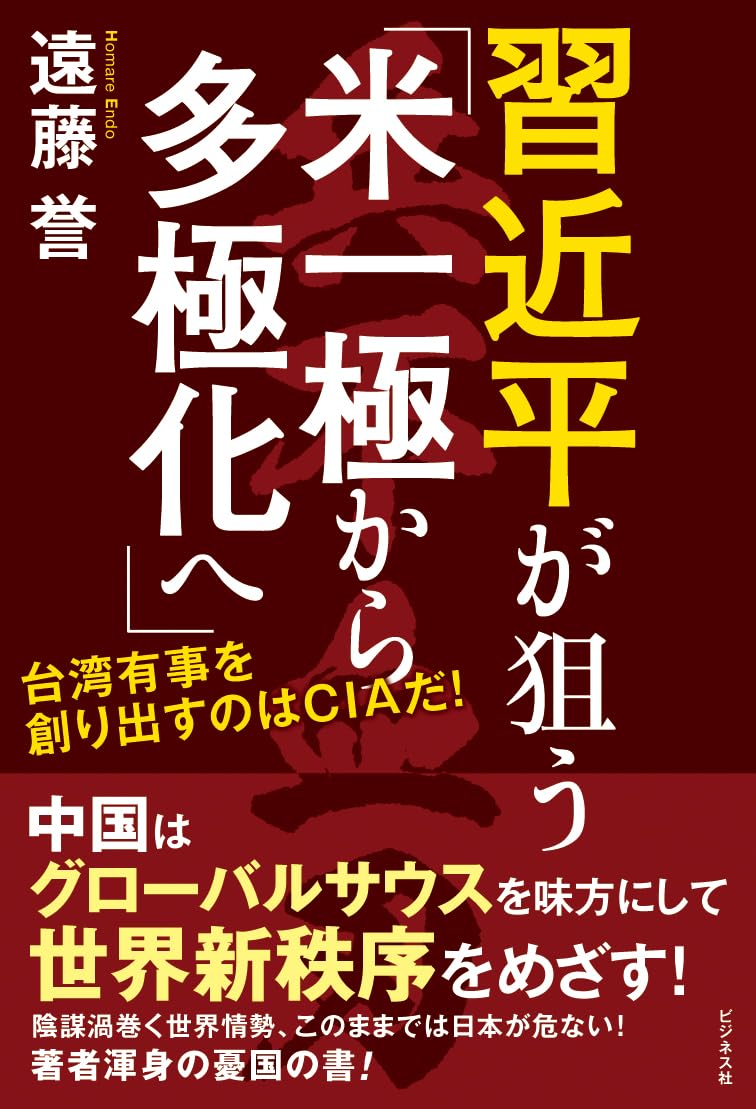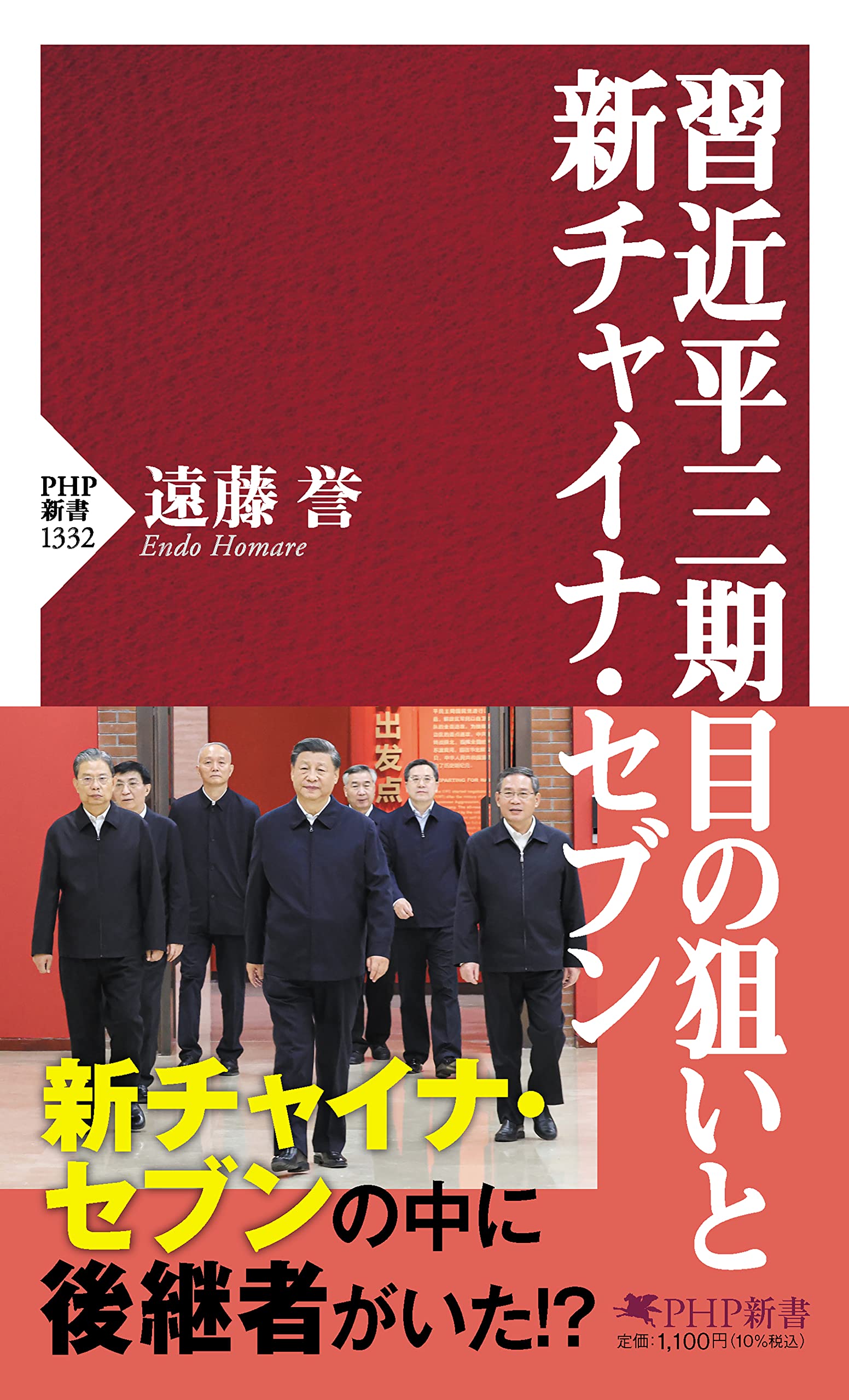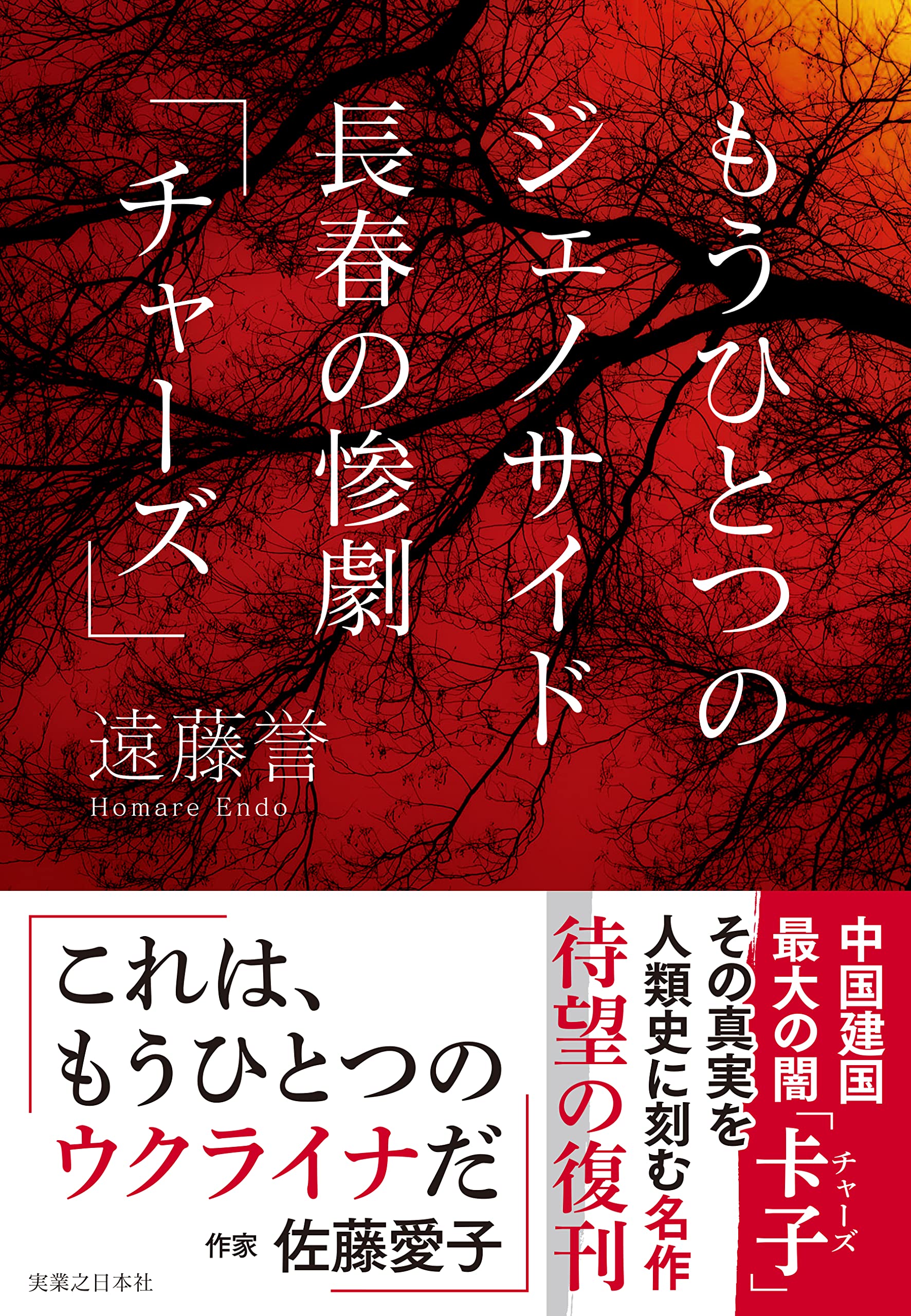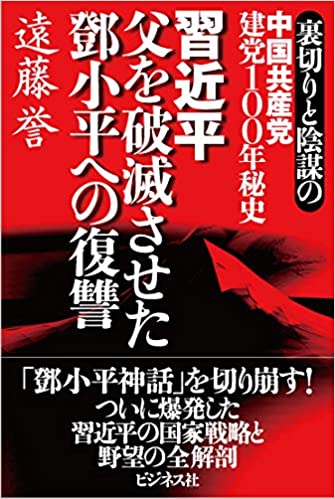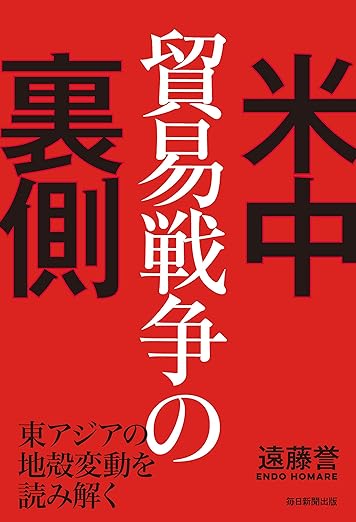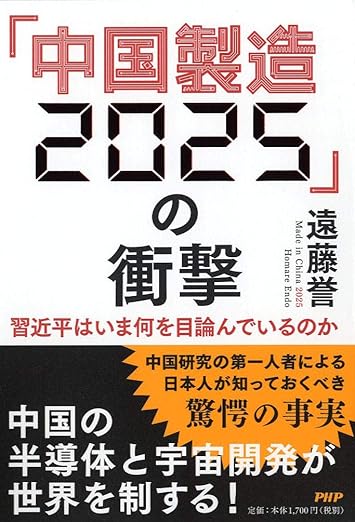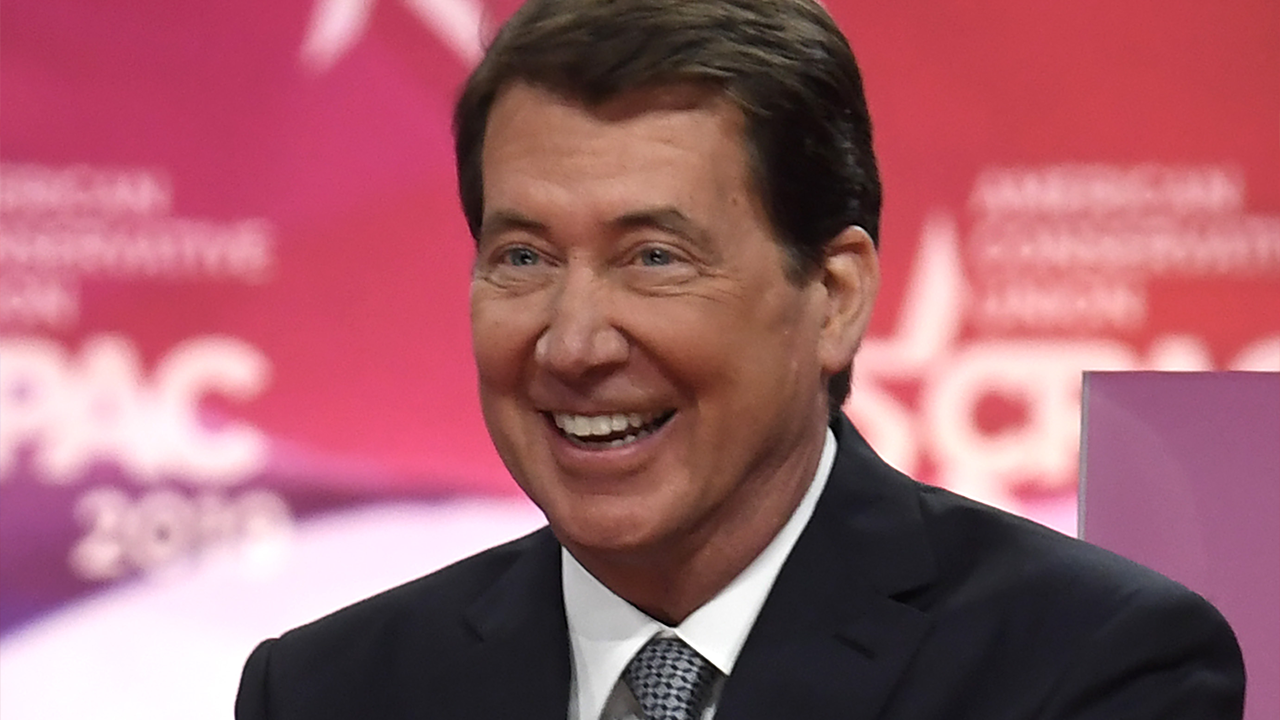
Think Tank — the first article
Verifying the remark of the U.S. Ambassador to Japan that “Huawei is a state-owned enterprise”
Amid the U.S.’s intensifying pressure to exclude the Chinese communications giant Huawei, the U.S. has yet to provide any evidential information for its remarks alleging that Huawei “wrongly obtains information and passes it to the Chinese government” and “has a back door.” In these circumstances, I conducted an interview with Huawei Japan in early June as I thought I should not keep relying on second-hand information alone.
Then, almost simultaneously, the U.S. ambassador to Japan, Mr. Hagerty, asserted loudly that “Huawei is a state-owned enterprise” in the news show Hodo Station broadcast by TV Asahi on June 14.
In this article, I will examine the “Hagerty statement” based on information obtained through the interview with Huawei Japan and other sources.
◆ What the ambassador actually stated
TV Asahi’s Hodo Station, which started at 21:54 as usual on the night of June 14, reported an interview with Ambassador Hagerty .
Mr. Hagerty looked stern when he said “Huawei is a state-owned enterprise,” despite the fact that he usually looks gentle and polite.
Let me roughly transcribe an extract of the interview around the time Mr. Hagerty said “state-owned enterprise.” ( “NA” is Narrator. “Tomikawa” is the newscaster of the program.)
NA: The G20 summit will be held in Osaka in two weeks. The focus of attention is whether the U.S. and China can step forward to find a solution to the trade friction.
Tomikawa: Expectations are particularly high for a U.S.–China summit meeting. Will it be held during the period of G20?
Hagerty: Whether that happens at the G20, I’m not certain, but I again feel the President would like to see something happen very soon. The time has come for China to change its behavior.
NA: The U.S.’s exclusive measure against the Chinese company Huawei is considered to be symbolic of the battle between these two nations. The Japanese public and private sectors are also gradually moving to suspend transactions with Huawei.
Tomikawa: When I interviewed Mr. Ren Zhengfei, CEO of Huawei, he confidently said he had never committed anything that would threaten the security of the U.S., and he had never committed espionage on behalf of the Chinese government. Does the U.S. still have to be afraid of Huawei as a threat?
Hagerty: I am certainly aware of the Chinese law that allows the Government of China to seek the information from any company that has access to it. Huawei is one of those companies, and therefore presents a clear security threat.
NA: While Huawei insists “We are a private company that is independent of the government,” the Ambassador strongly argues as follows.
Hagerty: Huawei is a state-owned enterprise. State-owned enterprises contaminate free markets. They compete unfairly. By clearing Huawei from the U.S. market, by keeping Huawei out of Japan, by keeping Huawei out of Australia, and other like-minded countries, we are creating an open market, a market where competition is fair and clean.
These are the questions and answers in the relevant part of the program.
Ambassador Hagerty described Huawei as a “state-owned enterprise,” which definitely means a “government-owned enterprise.”
◆ Is it correct to say “Huawei is a state-owned enterprise”?
First, let’s examine if Ambassador Hagerty’s statement “Huawei is a state-owned enterprise” is correct.
Huawei is a company with an employee stock ownership plan, which is known to those who are interested. KPMG, a Netherlands-based international accounting firm, conducted an accounting audit on Huawei’s share ownership ratio.
Established in 1870, KPMG is now one of the four major international accounting firms in the world. The current company was named after the initials of the founders who joined as partners (K: Piet Klynveld, P: William Barclay Peat, M: James Marwick, G: Reinhard Goerdeler).
According to the National Enterprise Credit Information Publicity System of Guangdong
at December 28th 2018, 1.01% of stocks are owned by Mr. Ren Zhengfei the CEO, and 98.99% is owned by Huawei’s labor union (therefore, employees), its percentage fluctuating between 0.1% and 0.4% depending on the year. What needs to be understood is that the Chinese government has no stakes in Huawei.
KPMG is the auditor of Huawei, and its data can be seen below. Huawei has been audited by JPMG since 2000 and these can be seen in page 69 of the 2018 annual report. The JPMG report as of March 27th 2019 can be seen below.
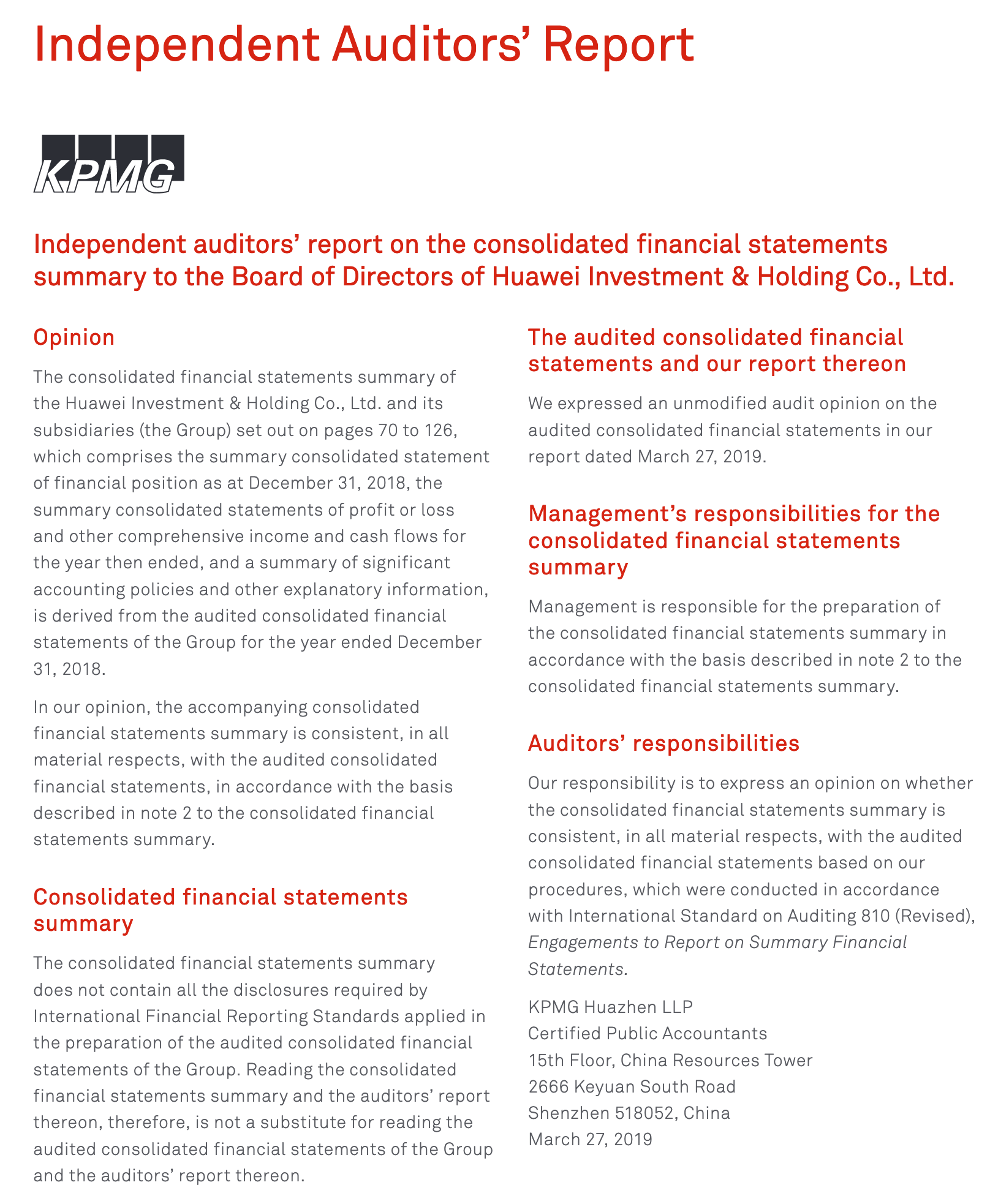
There is no state-owned enterprise without a government-owned stake. The KPMG report suggests that Huawei is clearly not a state-owned enterprise.
◆Disadvantages for America
Why should the American ambassador make such a baseless remark that anyone can easily recognize as being false?
By showing how closely connected he is with President Trump on the previous screen, the audience can imagine that the Ambassador’s remark may possibly reflect the intention of the President.
My question is, “Why did TV Asahi broadcast such an untrue remark made by the Ambassador which may adversely affect the credibility of the U.S.?”
Or did they intend to inform the world how the U.S.’s actions are based on an untrue fact by way of broadcasting the Ambassador’s absolutely false remark?
It is unlikely that the News Bureau of TV Asahi is unaware of the definition of a “state-owned enterprise.” TV Asahi could have been sincere enough to edit out that part for the honor of the U.S. or the Ambassador.
In any event, the exclusion of Huawei as being a threat based on a clearly untrue reason proves that the U.S.’s attack against Huawei cannot be justified, and this has also an adverse impact on the U.S which is unfortunate.
This is because for the past 70 years, only Trump has the possibility of destroying the Chinese Communist Party’s one-party dictatorship. This is a conflict between liberalism and socialism, a war of ideals. There were probably many who have put their hopes up.
However, it appears for now that the Chinese government support Huawei, but until the 1990s the Chinese government has attempted to crush Huawei. Evidence of this is found in the State Council regulations of 1993 and 1994.
For example, “60 Year Anniversary of China’s Financial System, 1993” posted on People.cn on August 17, 2009, expressly describes in its April column an official order promulgated by the State Council and the National Economic System Reform Commission to
“immediately terminate the employee stock ownership plan for internal workers.” The situation was aggravated to the point where Huawei CEO Ren Zhengfei could have been arrested if there had been non-conformity with the order.
Harassed by Beijing and unable to gain loans from domestic banks, it had to really on capital from their own employees and labor unions. This was the start of the employee stock ownership plan.
That’s also why Huawei had no choice but seek opportunities for development outside China. Overseas banks provided loans to Huawei.
According to Huawei Japan, Huawei has been financed by non-Chinese banks in most cases, with very few exceptions of Chinese banks.
◆ Is the Trump Administration blaming the right person?
The Trump administration is blaming the wrong person.
The question is why the Trump administration targets Huawei that has kept its distance from the Chinese government instead of state-owned enterprises such as ZTE and Tsinghua Unigroup which are equal to part of the Chinese government. The U.S. may have a sense of crisis because the technology of Huawei is almost surpassing that of the U.S.
This is especially true in the development of 5G (fifth generation) communication technology, in which Huawei has become one of the leading companies. Huawei is challenging the status of American tech-giants. Countries that will introduce 5G late, will face the problem of not just falling in their status regarding smartphones, but Internet of Things, self-driving cars and other communications infrastructure.
Yet, Huawei is not just leading in the area of 5G smartphones, but also as vendor for base transceiver stations (BTS).
According to HIS Markit report on the market share for the end of 2018 in mobile infrastructure, the 2017 share for BTS is; Huawei 27.9%, Ericsson 26.6%, Nokia 23.3%, ZTE 13%, NEC 1.4%, Fujitsu 0.9% etc. As we can see, Chinese companies essentially dominate the market.
What we have to understand from this data is that none of the major vendors is an American company.
The reason why American companies withdrew from BTS is a long story on its own (mostly a business decision not a technological one), there is the glaring truth in that China has surpassed America in next generation mobile communication infrastructure.
BTS has been setup all over the world from 2G to 4G, and to replace them will incur a tremendous cost. Still, America wishes to defeat Huawei, so will use any excuse for this end.
◆Do not weaken the base for America’s logic
If the United States wishes to bring down the one-party state under the power of the Chinese Communist Party, it must target state-owned companies such as ZTE and Unigroup which lead the high-tech industry. They are the Chinese government itself more than anything else, sharing a common interest with the Chinese Communist Party.
If attacked, Huawei, which has kept its distance from the Chinese government, would have to have a closer relationship with the Chinese government. In fact, the Chinese government has to turn around and support Huawei now although the company is a tough competitor with state-owned enterprises. As a Chinese company, it’s too big to ignore, especially considering that it is leading in 5G technology.
Any U.S. strategies missing this logic might result in a possible failure as it weakens America’s logic. I am afraid it might happen.
Regarding the law referred to by Ambassador Hagerty (National Intelligence Law), Huawei’s CEO has stated multiple times, that while Beijing has not demanded anything, if they insisted for Huawei to handover information, he will shut down the company.
Beijing has also stated that National Intelligence Law has no foreign jurisdiction, but for a country that enshrines free speech in their constitution, they suppress it. Whatever is written as law, nobody will believe that China follows a strict rule of law. Obviously, people will doubt this.
Therefore, if America has the intention of destroying the Chinese one-party state, it must provide objective truths that cannot be countered.
Addendum as of June 29th: The above has been written on June 15th, but the G20 summit in Osaka held in June 29th, after Sino-US summit talks, President Trump announced that he will consider lifting the bans on Huawei, and that it can resume normal trades. Apparently, this is influenced on the voices of companies in Congressional hearings on how this is hurting their business. This is the power of democratic states in which the voices of the people can be heard, and where normal elections are held. However, this can also be a weakness. To the above, Trump has put conditions, such as that it should not pose any national security problems, and whether to remove Huawei from the entity list is still up to debate, so we will have to be cautious as to future developments.
As to why President Trump has decided to change course, I would like for readers to refer to a separate column which will analyse this.
(This paper was written on 15 June.)
カテゴリー
最近の投稿
- 記憶に残る1月
- 高市圧勝、中国の反応とトランプの絶賛に潜む危機
- 戦わずに中国をいなす:米国の戦略転換と台湾の安全保障を巡るジレンマ
- トランプ「習近平との春節電話会談で蜜月演出」し、高市政権誕生にはエール 日本を対中ディールの材料に?
- NHK党首討論を逃げた高市氏、直後に岐阜や愛知で選挙演説「マイク握り、腕振り回し」元気いっぱい!
- A January to Remember
- Managing China Without War: The U.S. Strategic Turn and Taiwan’s Security Dilemma
- 「世界の真ん中で咲き誇る高市外交」今やいずこ? 世界が震撼する財政悪化震源地「サナエ・ショック」
- 中国の中央軍事委員会要人失脚は何を物語るのか?
- 個人の人気で裏金議員を復活させ党内派閥を作る解散か? しかし高市政権である限り習近平の日本叩きは続く



